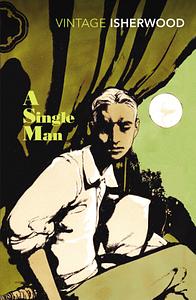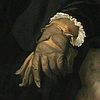You need to sign in or sign up before continuing.
Take a photo of a barcode or cover
I didn't want this book to end. I actually listened to the last chapter twice because I didn't want to admit it was over. Beautiful, mesmerizing, enchanting. I actually loved the movie which I saw before reading (well, listening) to this. I think this is one instance where the movie although not quite as great as the book, comes petty dang close to capturing what the book intended for it's audience.
I saw the movie before reading the book, but that didn't ruin anything. It was an amazing book, and it has been a long time since I read such a good fiction. It is well written, the plot is very interesting and the characters are fascinating.
the beginning and the ending of the book really made me go
Quiet and brilliant and moving. I was going to write a review but the bottom line is just: read this book. You can read it in an evening and it will be a contemplative and wonderful evening. Just read it, okay?
Interessant. Erinnert mich an den Film Oh boy. lesen hat spaß gemacht.
emotional
reflective
sad
slow-paced
Plot or Character Driven:
Character
If I am going to be honest, this is more like a 1.5-star book. The first 10 pages of this book gave me hope. If Christopher Isherwood had given me 190 more pages of the same thing, A Single Man would no doubt be one of my favourite books of the year. The descriptions of George waking up in the morning, getting dressed and thinking about Jim is some of the best writing on loneliness that I have ever come across.
Then there is the rest of the book.
Take a piece of paper, and this paper represents George's heart. Now take a penknife and carve out vaguely humanoid shape, and let's call it Jim. But instead of talking about the Jim-shaped hole in George's life, A Single Man is more concerned with... what exactly? The book is mostly a collection of disconnected, meandering vignettes as George goes through his day. He drives to work and fantasises about beating people up on the freeway; he argues about Greek mythology with his students in school; he laments about the apartment block that now blocks direct views of the oceanfront near his home. These are no doubt random thoughts that normal people like you and me have in the course of a day, but after the first 10 pages of George thinking about the death and loss of Jim, it makes a strange detour to focus on mundane everyday nothings.
And that is the case for the rest of the book, really. Nothing actually happens, and Jim seldom ever factors into his everyday life, it seems. Ultimately, it's not a complete roadkill, but it sure does smell like it. The overwhelming sensation I have at the end of the book, more than anything else, is 'disappointing'.
Then there is the rest of the book.
Take a piece of paper, and this paper represents George's heart. Now take a penknife and carve out vaguely humanoid shape, and let's call it Jim. But instead of talking about the Jim-shaped hole in George's life, A Single Man is more concerned with... what exactly? The book is mostly a collection of disconnected, meandering vignettes as George goes through his day. He drives to work and fantasises about beating people up on the freeway; he argues about Greek mythology with his students in school; he laments about the apartment block that now blocks direct views of the oceanfront near his home. These are no doubt random thoughts that normal people like you and me have in the course of a day, but after the first 10 pages of George thinking about the death and loss of Jim, it makes a strange detour to focus on mundane everyday nothings.
And that is the case for the rest of the book, really. Nothing actually happens, and Jim seldom ever factors into his everyday life, it seems. Ultimately, it's not a complete roadkill, but it sure does smell like it. The overwhelming sensation I have at the end of the book, more than anything else, is 'disappointing'.
2.5/5
This is a weird book; a "product of its times," even, if one has the wherewithal to let the usual chorus in for only a moment before beating them back out with a broom again. Yes, there is queerhood. Yes, there is tragedy. There are also some weird racialisms and outright insipidities regarding power structures, as well as the sorts of graspings at human connection through means of obscene levels of objectification that makes one somewhat grateful for the age of the distanced engagement. I probably would have liked it more had it not been set in the much abused landscape wherein I acquired my college education, but huge swathes of myopically English concerns set amidst a multicultural world that, to throw Isherwood's words back at him, receive at best the patronizing good graces of "a mixed metaphor [that] doesn't mean anything" would be tedious in any scenario. I get that this work is meant to be what the title so aptly encompasses, and lord knows I've developed my own fair share of neurotic self awareness, trauma, and huge chasms of mistrust thrust upon me by the intersection of legal frameworks and personal experiences that controls many a person's queerhood, but if there's one thing that makes a tiresome muddle of things in the world of reading and readers, it's excess of sentiment in popular opinion, and this is one of those works where I feel as if I'm in an alternate timeline compared to most of the loudest reviewers on this site. Cruel as this may be, I see the comforting platitudes interspersed amongst many quotes chosen to embellish one reader's reaction or another, and I say, if that is what I was looking for, I would have opened up a Hallmark card, not a classic of queer literature. It's to the point where I have to wonder whether, had these readers been more honest, would I have liked this work better? Or perhaps it's a matter of, if these readers had more to lose when it comes to the realities of this work, the story would have been a tad more complicated to them than life, death, and a small diversity bonus, and thus would have necessitated more complex reactions than a small self-indulgent a-boo-hoo-hoo followed by an almost obscenely speedily cathartic moving on. Impossible to say, but worth taking note of nonetheless.
Perhaps I've been spoiled by my having come of age in a time where torture porn masquerading as queer rep has become increasingly unacceptable and teenage boys don't beat other teenage boys half to death and then tie them to barbed wire fences for the coyotes to eat because the victim looked at another boy funny (leastwise as often as they used to), but if I gave this work to any of my queer friends and accompanied the giving with unmitigated praise, their responses would be lukewarm at best and disgusted at worst. This work certainly encompasses the some of kinds of marginalized fumblings at the outskirts of respectable (aka non target practice) society that, surprise surprise, same sex marriage has hardly provided real solutions for, but it still smacks of the kind of queer work written by a rich white dude who admits that he would divorce his husband in a heartbeat if it meant he could become straight. The work certainly deals with the kinds of extremely serious issues that I normally seek in my reading, but if there's one thing I've noticed in US media both past and present, it's how willing the creators are when it comes to killing off one or more side characters for the sake of the pathos of the main who ultimately controls the pathos of the status quo audience. So, when considering the events involving Isherwood and his 31 years younger lover that inspired this work, as well as the novel's ultimate conclusion, it feels as if the plot got bookended by wallops on the head in order to not have to deal with the harder, less interesting, and thus oftentimes far more important questions of queer interpersonal relationships and queer living one's best life while there is still life left to live. One might say that it was "too soon" to expect that kind of work to be published at the time this particular work was put out, but that doesn't automatically entail that this work get the almost ubiquitous "bended knee" reception it apparently has received since its publication. Yes, a gay man is dead. I'm concerned about the readers who think that, having read this, they never have to read about a dead gay man again.
Perhaps this is yet another reading experience that fell victim to false advertising, but this is the kind of work that I know many who read this sort of material for reasons other than finding oneself will flock to as their single, vetted, non-opprobriated piece of queer literature, and I'd do no favors for those readers who are not of that sort by mincing matters. The film adaptation of this seems to be the type of warmly golden tinged just-enough-but-not-too-much stoic emotional breakdown that the tragically alone white male soul is so compatible with, aka the kind that obfuscates reader reception of the original work too much for me to willingly engage with. I'll still be reading Isherwood's 'Berlin Stories' at some point, but I'm hoping that the historical venue not being so close to home will distract me enough to forgive the more solipsistic/exotifying turns of phrase, or at least entertain me enough with the fact that the general tone isn't largely one of the maudlin void. All in all, certainly a sad work that complicated what it means to be queer when you get down to it. Reducing it to just the sadness at the expense of the rest of the work, the good and the ill, however, is not justification enough for it to remain a classic.
This is a weird book; a "product of its times," even, if one has the wherewithal to let the usual chorus in for only a moment before beating them back out with a broom again. Yes, there is queerhood. Yes, there is tragedy. There are also some weird racialisms and outright insipidities regarding power structures, as well as the sorts of graspings at human connection through means of obscene levels of objectification that makes one somewhat grateful for the age of the distanced engagement. I probably would have liked it more had it not been set in the much abused landscape wherein I acquired my college education, but huge swathes of myopically English concerns set amidst a multicultural world that, to throw Isherwood's words back at him, receive at best the patronizing good graces of "a mixed metaphor [that] doesn't mean anything" would be tedious in any scenario. I get that this work is meant to be what the title so aptly encompasses, and lord knows I've developed my own fair share of neurotic self awareness, trauma, and huge chasms of mistrust thrust upon me by the intersection of legal frameworks and personal experiences that controls many a person's queerhood, but if there's one thing that makes a tiresome muddle of things in the world of reading and readers, it's excess of sentiment in popular opinion, and this is one of those works where I feel as if I'm in an alternate timeline compared to most of the loudest reviewers on this site. Cruel as this may be, I see the comforting platitudes interspersed amongst many quotes chosen to embellish one reader's reaction or another, and I say, if that is what I was looking for, I would have opened up a Hallmark card, not a classic of queer literature. It's to the point where I have to wonder whether, had these readers been more honest, would I have liked this work better? Or perhaps it's a matter of, if these readers had more to lose when it comes to the realities of this work, the story would have been a tad more complicated to them than life, death, and a small diversity bonus, and thus would have necessitated more complex reactions than a small self-indulgent a-boo-hoo-hoo followed by an almost obscenely speedily cathartic moving on. Impossible to say, but worth taking note of nonetheless.
Perhaps I've been spoiled by my having come of age in a time where torture porn masquerading as queer rep has become increasingly unacceptable and teenage boys don't beat other teenage boys half to death and then tie them to barbed wire fences for the coyotes to eat because the victim looked at another boy funny (leastwise as often as they used to), but if I gave this work to any of my queer friends and accompanied the giving with unmitigated praise, their responses would be lukewarm at best and disgusted at worst. This work certainly encompasses the some of kinds of marginalized fumblings at the outskirts of respectable (aka non target practice) society that, surprise surprise, same sex marriage has hardly provided real solutions for, but it still smacks of the kind of queer work written by a rich white dude who admits that he would divorce his husband in a heartbeat if it meant he could become straight. The work certainly deals with the kinds of extremely serious issues that I normally seek in my reading, but if there's one thing I've noticed in US media both past and present, it's how willing the creators are when it comes to killing off one or more side characters for the sake of the pathos of the main who ultimately controls the pathos of the status quo audience. So, when considering the events involving Isherwood and his 31 years younger lover that inspired this work, as well as the novel's ultimate conclusion, it feels as if the plot got bookended by wallops on the head in order to not have to deal with the harder, less interesting, and thus oftentimes far more important questions of queer interpersonal relationships and queer living one's best life while there is still life left to live. One might say that it was "too soon" to expect that kind of work to be published at the time this particular work was put out, but that doesn't automatically entail that this work get the almost ubiquitous "bended knee" reception it apparently has received since its publication. Yes, a gay man is dead. I'm concerned about the readers who think that, having read this, they never have to read about a dead gay man again.
Perhaps this is yet another reading experience that fell victim to false advertising, but this is the kind of work that I know many who read this sort of material for reasons other than finding oneself will flock to as their single, vetted, non-opprobriated piece of queer literature, and I'd do no favors for those readers who are not of that sort by mincing matters. The film adaptation of this seems to be the type of warmly golden tinged just-enough-but-not-too-much stoic emotional breakdown that the tragically alone white male soul is so compatible with, aka the kind that obfuscates reader reception of the original work too much for me to willingly engage with. I'll still be reading Isherwood's 'Berlin Stories' at some point, but I'm hoping that the historical venue not being so close to home will distract me enough to forgive the more solipsistic/exotifying turns of phrase, or at least entertain me enough with the fact that the general tone isn't largely one of the maudlin void. All in all, certainly a sad work that complicated what it means to be queer when you get down to it. Reducing it to just the sadness at the expense of the rest of the work, the good and the ill, however, is not justification enough for it to remain a classic.
'I keep remembering that beautiful accent. It's like music.' (George is strongly tempted to ask her just which accent she has in mind. Can it be Cockney or Gorbals?)
emotional
reflective
fast-paced
Plot or Character Driven:
Character
Strong character development:
Yes
Loveable characters:
Yes
Diverse cast of characters:
Yes
The ending got me on this one
Paragono la mia esperienza con A Single Man a una scalata. Più la vetta si avvicinava, più avevo paura di cadere dalla stradina stretta e ripida che stavo percorrendo. È stata una scalata anche nel senso di crescendo, perché dall'incertezza iniziale (l'incipit, l'it che diventa George) è andato migliorando pian piano.
Accompagniamo George nell'arco di ventiquattr'ore e scopriamo la vita di quest'uomo inglese, gay, vicino ai sessanta, insegnante in California, "vedovo". La morte del compagno Jim non è un'ossessione, George non è costantemente travolto dal dolore: conduce una vita normale, Jim è un ricordo che riaffiora soltanto nelle differenze tra presente e passato. Seguiamo George anche nei momenti più mondani, come quando va di corpo o si masturba, e non è mai volgare, contribuisce anzi a creare un quadro completo.
Isherwood scrive in modo pulito, non indugia, non scade nel melodramma. Il risultato? Un personaggio riuscitissimo e credibile e un libro equilibrato, delicato, toccante, sensuale.
Accompagniamo George nell'arco di ventiquattr'ore e scopriamo la vita di quest'uomo inglese, gay, vicino ai sessanta, insegnante in California, "vedovo". La morte del compagno Jim non è un'ossessione, George non è costantemente travolto dal dolore: conduce una vita normale, Jim è un ricordo che riaffiora soltanto nelle differenze tra presente e passato. Seguiamo George anche nei momenti più mondani, come quando va di corpo o si masturba, e non è mai volgare, contribuisce anzi a creare un quadro completo.
Isherwood scrive in modo pulito, non indugia, non scade nel melodramma. Il risultato? Un personaggio riuscitissimo e credibile e un libro equilibrato, delicato, toccante, sensuale.
Think of two people, living together day after day, year after year, in this small space, standing elbow to elbow cooking at the same small stove, squeezing past each other on the narrow stairs, shaving in front of the same small bathroom mirror, constantly jogging, jostling, bumping against each other’s bodies by mistake or on purpose, sensually, aggressively, awkwardly, impatiently, in rage or in love – think what deep though invisible tracks they must leave, everywhere, behind them! The doorway into the kitchen has been built too narrow. Two people in a hurry, with plates of food in their hands, are apt to keep colliding here. And it is here, nearly every morning, that George, having reached the bottom of the stairs, has this sensation of suddenly finding himself on an abrupt, brutally broken-off, jagged edge – as though the track had disappeared down a landslide. It is here that he stops short and knows, with a sick newness, almost as though it were for the first time: Jim is dead. Is dead.
He stands quite still, silent, or at most uttering a brief animal grunt, as he waits for the spasm to pass. Then he walks into the kitchen. These morning spasms are too painful to be treated sentimentally. After them, he feels relief, merely. It is like getting over a bad attack of cramp.





